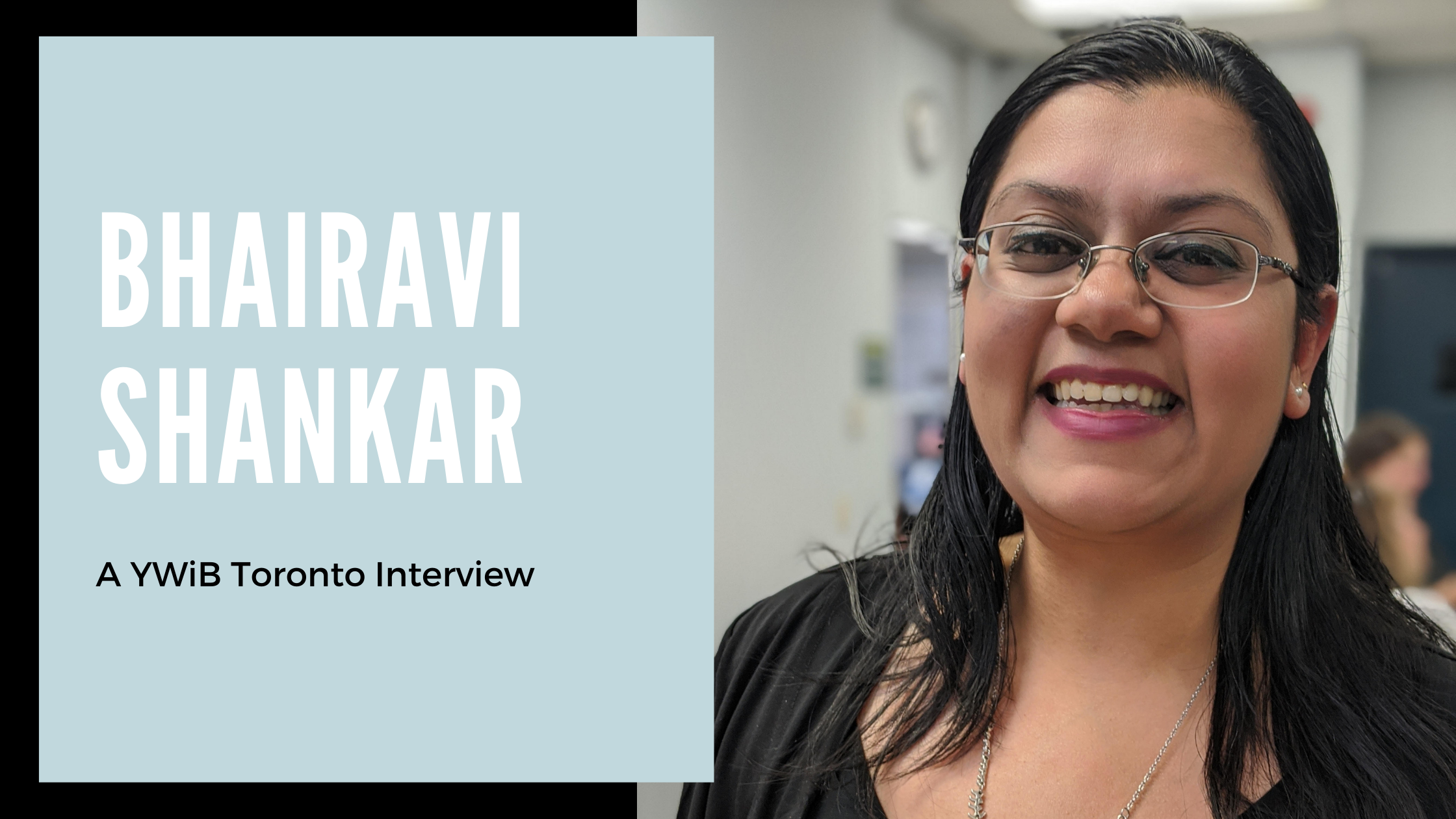Bhairavi Shankar on why there's 'space' for everyone in the STEAM sector.
/Young Women in Business Toronto (YWiB) aims to provide our diverse community of young, self-identified women with genuine career advice, encouragement, and examples of local role models. That's why, for the next few months, we’ll be interviewing both career professionals and entrepreneurs our community can be inspired by and learn from.
Dr. Bhairavi Shankar, Planetary Geologist, CEO & Founder of Indus Space
Hi, Bhairavi! Tell us a little bit more about yourself and your current initiative, Indus Space.
My name is Bhairavi Shankar, I’m a Planetary Geologist of South Asian descent, a Science Communicator, and an Entrepreneur. I founded Indus Space in 2018; a social enterprise that engages the general public about topics of space exploration and its relation to the STEAM (Science, Technology, Engineering, Art, and Math) sector. We run space-based programming - in-person and virtual - and are in the process of creating products that are helpful for the learning process.
I’m also a proud immigrant and a dog-parent!
Amazing! When did you first fall in love with space and science? Was there any particular influence or experience that drove this passion?
As a child, I seemed to be interested in the night sky and sky in general. My mom used to tell me that when we had a film roll, the guy at Kodak who processed it (some of your younger community members may not know anything about this!) would always ask why there were always so many photos of just blue sky. It was because I always wanted her to point the camera up at the sky and just click.
As part of my high school requirement of 55 volunteer hours, I wanted to explore astronomy but didn’t know what to do. With my mom's help we looked up the phone directory and found the Royal Astronomy Society of Canada (RASC). I was able to volunteer with the Toronto chapter, handling new memberships. Through that experience, I also watched my first lunar eclipse on a cold January night. As of that moment, I was totally hooked. Seeing this amazing phenomenon, meeting other academics and amataur astronomers through RASC; these experiences grew my passion for space. In grade 13 (another puzzler for our Gen Z friends?) I also did a co-op placement at a university, job-shadowing a professor. I got a lot of practice using a telescope on location to observe the sun.
I started an undergraduate degree in astronomy at University of Toronto then came across a program in Planetary Science at the downtown campus. I also took electives in geology and realized I could combine my love of astronomy with my passion for plate tectonics and geology.
Very impressive! Bhairavi, you went on to complete a Ph.D in Geological Sciences (Planetary Science) in 2013. How would you describe your experience as a woman-identified scientist in STEAM?
To be honest, as a student in that process and at the time... I think I was just going through the motions. I was focused on meeting my program requirements. In retrospect, I recognize I was often the only woman of colour in many rooms. I didn't notice it at the time but I was definitely one of a small number of BIPOC students in my program. Though I had a positive experience, there were aspects of myself and my culture I think I had to ignore through my academic life because there wasn’t necessarily an opportunity to share it.
When I look back I also suspect there were some opportunities I wasn’t privy to or accepted for, especially around funding. Did I not get things because of my name? Identity? Gender? I can't say directly, but why didn’t I know about opportunities in time? Now that I am outside of academia and in the business world, it’s a bit of a more obvious observation.
I am dedicated to introducing young women and underrepresented demographics to discovery and opportunities in STEAM.
Read: YWiB Role Model Interviews: Vanessa Vakharia helps you overcome your math fears
What prompted you to choose a career in education versus continuing with academia?
The skills I gained through my Ph.D helped me to grow beyond the academic world. In hindsight, it would’ve been nice to know of other career options besides the assumed track as a professor. At the time I thought I was going to go into academia so I would need to be in research/a professor.
I began to realize there were substantial gaps in the system; women and minorities were not represented in the top roles within the space sector. When I looked at the problem closely and when this exclusion might start, I realized it was as early as in the K-12 school process. Curriculum recommendations include space exploration topics yet when you talk to youth and teachers, most don’t really know what is possible in terms of exciting space education. Some of what you see is text-book heavy educational resources and basic explanations of the planets or what makes the front page news. As a result, children and young adults don’t realize there are countless opportunities for them in STEAM- especially in space. There is more than just the USA and NASA doing cool stuff in space. There’s so much potential for exhilarating learning and activities! I became motivated to help young people experience space exploration and exciting careers in STEAM.
On the Indus Space website it says that there is an identified need for education in global space. What advice would you give to young women (25-35) wanting to explore it as a career?
If they know what they want to do or identify someone else in that type of role, they should reach out to make a connection and chat with them. I recommend conducting an informational interview to learn about the challenges and positives of the sector. They should also find ways to explore the industry through volunteering (in high school) or internships. Twitter is also a great way to engage in conversations and learn about the sector. I’ve found there’s lots of STEAM conversations on that platform.
One thing I like to remind people is that you don’t necessarily need to go back to school to study astronomy. There are countless critical roles for putting people and tech into space. Whatever skills you have, there’s always space- pardon the pun- to add your skills.
For example, having a marketing or a social sciences background could really benefit the industry, especially in increasing awareness and inclusion in the sector. We are all humans after all, working on this, so we need people with operations, social/psychological and other expertise to make it happen. Even chefs, fashion designers... people need to eat in space and have space suits! Every skillset matters in the space sector, so there will always be a role that can be incorporated into a broader space science challenge.
You mentioned that diversity is not currently reflected in various roles such as leadership positions within the space sector. How is Indus Space helping address this gap?
We reach out to and partner with organizations that encourage girls’ exploration in STEAM and actively with minority communities. Another initiative we are working on is getting accessible education into communities. We are constantly trying to find better ways to meet needs and reach people in culturally-responsive ways.
My current team is almost all women which is also pretty cool!
Read: YWiB Role Model Interviews: Shakira Rouse on learning disabilities, stigma, and the workplace
Can you recommend any local resources or networks that women entrepreneurs should tap into?
There are entrepreneurship hubs in various neighbourhoods, not just in downtown Toronto. I benefit a lot from EDGE Sheridan located in Mississauga, where I live. Try to find centres that are locally accessible to you and don’t limit yourself to just one hub as they all have different offerings and cater to specific sectors (ex: tech startups). I also recommend Business in the Streets (BITS) and the Women’s Entrepreneurship Hub (WE-Hub).
As far as STEAM specific, as I mentioned before there is a huge science community on Twitter. If you’re South Asian, check out Lotus STEMM which I am also a part of. This organization is focused on South Asians in the STEMM sector (the extra ‘M’ is for medicine).
Bhairavi, last question: what excites you the most about the future?
I appreciate there seems to be growing awareness of the gaps in representation in STEAM, especially women in leadership roles and underrepresentation of Black, Indigenous, and POC communities. I think current events are forcing the discussion and intention to address these issues. As Indus Space is one of the organizations devoted to and accountable for change, I am actively working to help bridge the gap.
It’s 2020; we should all be doing our part to increase representation and ensure that positive, inclusive opportunities are available to everyone.
Dr. Bhairavi Shankar is a Space Scientist, an independent research scientist, and the founder of Indus Space based in the Greater Toronto Area (GTA). Bhairavi works in a field that combines both space science, geography, and geological analyses. As a woman in the Space/STEM fields, and of South Asian background, Bhairavi values opportunities to promote the role of all women in STEM and to inspire future generations to join the STEM community. She is a chairperson of Lotus STEMM, and co-founder of WOCSCan.


